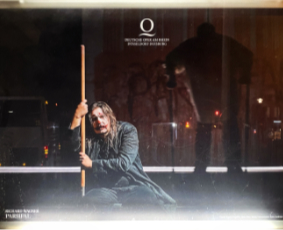Parsifal, Germany 1882. Composed and written by Richard Wagner, directed by Michael Thalheimer (production) and Axel Kober (music).
Deutsche Oper am Rhein, 2nd Gallery, Row 1, Seat 13.
(This post originally appeared, in shorter form, at my Instagram account betweendrafts.)
The ensemble from this production at Deutsche Oper am Rhein was great. The orchestra too, even if it took them a while to get in the groove—they finally excelled, and the brass kicked serious ass in the final act. They all got the standing ovations and bravos they deserved.
As for the production itself, I didn’t care for it. The stage design was bare-bones, which is fine, but everything else was over the top, with too many gimmick decisions and a severely undercooked choreography.
Now, the opera. It has its moments, some of them terrific and even sublime. But it doesn’t exactly feel tightly focused, which is in no small part the fault of Wagner’s own libretto, which the music then scrambles to follow. To start with, one could quip Parsifal’s roughly 4h 15m contain 7 hours of backstory, which wouldn’t be wrong. (Still, things do happen from time to time—against Tristan und Isolde at least, Parsifal would qualify as action-packed.)
Then, of course, it’s utterly bonkers. To start with, there’s so much not making sense whatsoever that Mozart’s Zauberflöte appears like an exercise in propositional logic in comparison. And then, come on. I like my Christo-Pagan High Fantasy Urban Vampire Zombie Crossover with Bodysnatchers thrown in like the next guy, but Parsifal’s really trying too hard. I mean—the knights don’t eat but are fed by the Gral which held Jesus’s blood; Amfortas’s dead father is regularly consulted in his crypt; Klingsor grows plant-women in his garden to ensnare the knights; and all that’s just for starters. Both stage and costume design went with these themes full throttle—Act I Scene II in particular looked as if Dawn of the Dead’s zombie hordes had lost their way in the mall and wound up in the nightclub from Blade.
Over time, some have read antisemitic tropes into the play, which I truly think is nonsense. Which doesn’t mean, of course, that Wagner’s rabid antisemitism wasn’t at play around its production—you can read up on this here. For your edification:
The conductor of the premiere was Hermann Levi, the court conductor at the Munich Opera. Since King Ludwig was sponsoring the production, much of the orchestra was drawn from the ranks of the Munich Opera, including the conductor. Wagner objected to Parsifal being conducted by a Jew (Levi’s father was in fact a rabbi). Wagner first suggested that Levi should convert to Christianity, which Levi declined to do. Wagner then wrote to King Ludwig that he had decided to accept Levi despite the fact that (he alleged) he had received complaints that “of all pieces, this most Christian of works” should be conducted by a Jew. When the King expressed his satisfaction at this, replying that “human beings are basically all brothers”, Wagner wrote to the king angrily: “If I have friendly and sympathetic dealings with many of these people, it is only because I consider the Jewish race as the born enemy of pure humanity and all that is noble about it.”
Finally, there’s really only one interesting character in this play, which is of course Cundry. I’m biased here, yes. I even wrote an academic paper on Wolfram’s Cundrie once! (By the way, to say that Parsifal is based on Wolfram—or Chrétien, for that matter—is like saying that Ben Hur is based on the Bible.) Cundrie rocks, and that’s even true for the incoherent mess Wagner’s libretto has turned her into.
________________
All Music & Theater Reviews
If you have something valuable to add or some interesting point to discuss, I’ll be looking forward to meeting you at Mastodon!

